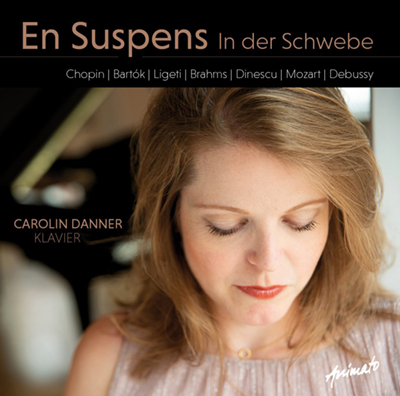„The album “En suspens – In der Schwebe” explores the feeling of being “in limbo” musically. In its portentous form, this feeling has been a silent and steady companion of the Corona pandemic, from 2020 on, further intensified by Russia’s attack on Ukraine on February 24, 2022. Whether as a result of stalled political decisions and developments, or of a lack of long-term plannability, whether due to the ubiquitous, imminent threat of serious illness or to the resurfacing threat of economic crisis and nuclear war – feeling “in limbo” has always been and is now more than ever, an integral part of the human experience. This proves to be especially true in crises. Nothing is really certain anymore, the nostalgically tinted certainties of the past decades are eradicated and with it, precious peace of mind.
However, when you take a step back, there is also a positive side to this state of mind: it can be a liberating experience to relinquish control, to dwell neither on the past nor overly fret about the future, but instead to be completely present in the moment, to make the most of the here and now. Mankind has always strived to embrace this positive side of being in-between, for example through meditation. And in the guise of mindfulness, this age-old concept has been recently gaining increased attention.
Inspired by her own personal experiences from these past years, Carolin Danner has selected a slate of music, inspired by the myriad facets of being caught “in limbo”, thus offering a contemporary glance into the special circumstances we live in today. The many aspects of being present in the moment, both pleasant and unpleasant, are explored musically: miniatures capture a moment in György Ligeti’s En suspens as does Violeta Dinescu’s Sonnenstrahl (sunbeam), a premiere recording; improvisations written down by Wolfgang Amadeus Mozart in his Fantasia in C minor transport particularly intense moments from his concertos to the present day; two Nocturnes in C-sharp minor by Fréderic Chopin cloak us in loosely-knit nocturnal hues. With …D’un cahier d’esquisses, Claude Debussy’s compositional sketchbook open-handedly offers the listener a glimpse of moments here and gone while his work L‘Isle Joyeuse is a fleeting breath of pure happiness. Béla Bartók’s Suite op. 14 leaves us dolefully hanging unresolved and Johannes Brahms’ last piano work op. 119 winds its way through transcendent intermezzi, evolving incrementally from deeply felt ambiguity, building layer upon layer of reality, culminating in a gripping and resolute rhapsody. The works by Debussy, Bartók, and Brahms are connected biographically with the composers’ personal crises.“
Album Download
ProgrammE
- W.A. Mozart – Fantasie in c-moll KV 475
- Dinescu – Sonnenstrahl
- Ligeti – En Suspens
- Brahms – Klavierstücke op. 119
- Bartòk – Suite op. 14
- Chopin – Zwei Nocturnes in cis-moll, op. 27/1 und KK Iva Nr. 16
- Debussy – D’un cahier d’esquisses
– L’isle joyeuse
Presse
„Musik aus Spanien oder mit spanischem Kolorit von Domenico Scarlatti, Debussy, Ravel, de Falla bis hin zu Albéniz und José Zárate spielt Carolin Danner mit ausgefeilter Technik, feurigem Temperament und Sinn für Klangfarben.“
Tonkünstler-CD-Tipps zu Weihnachten, neue musikzeitung 12/15 – Franzmeter Messmer
„Spanische Impressionen – eine liebevolle Zusammenstellung von spanischer Klaviermusik aus drei Jahrhunderten.“
Deutschlandradio Kultur 07/14 – Philipp Quiring
„Manuel de Fallas intrikate Fantasia baetica hat man schon lange nicht mehr mit einem so unerbittlichen Ernst gehört, und Enrique Granados‘ Andaluza sowie Albéniz‘ Asturias wirken gerade durch ihre Geradlinigkeit so authentisch. Die rhythmische Strenge tut letztlich auch den spanischen Impressionen von Debussy und Ravel gut.“
PianoNews 06/14 – Robert Nemecek
„Mit ihrem Album „Spanische Impressionen“ gibt Carolin Danner nicht nur einen Einblick in die Vielfalt der spanischen Musik, sie bewegt sich auch stilvoll in den unterschiedlichen Epochen und unterstreicht die Eigenarten, man könnte auch sagen die Entwicklung. Dabei erweist sie sich als vielseitige Pianistin mit einer durchaus ansteckenden Leidenschaft für España.“
Hessischer Rundfunk hr2 kultur 05/14 – Adelheid Kleine
„In diesem Programm (…) bringt die Pianistin ihre Sensibilität zum Ausdruck und zeigt ihre Beherrschung des Instruments. Sie nutzt den richtigen Stil, führt einen sauberen Anschlag aus und artikuliert streng, was dem ‚Andaluza‘ der ‚Danses espagnoles‘ von Granados zugute kommt – hoch aufgeschossen, unruhig, poetisch – und auch dem ‚Asturias‘ der ‚Suite espagnole‘ von Albéniz, mit glühender Lyrik.“
ConcertoNet 04/14 – Sébastien Foucart
